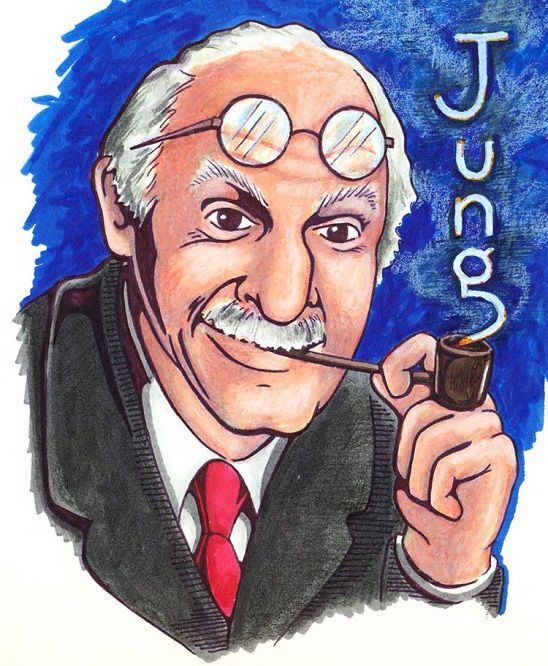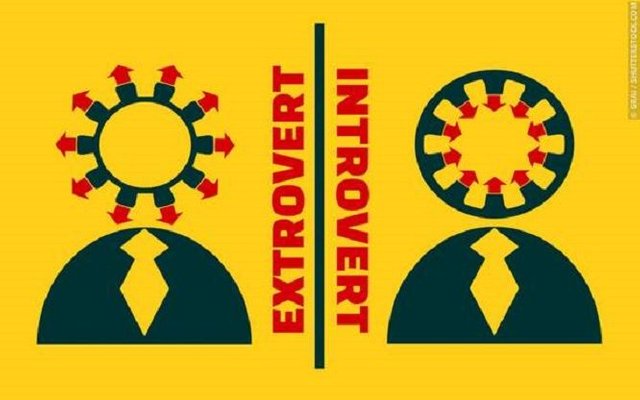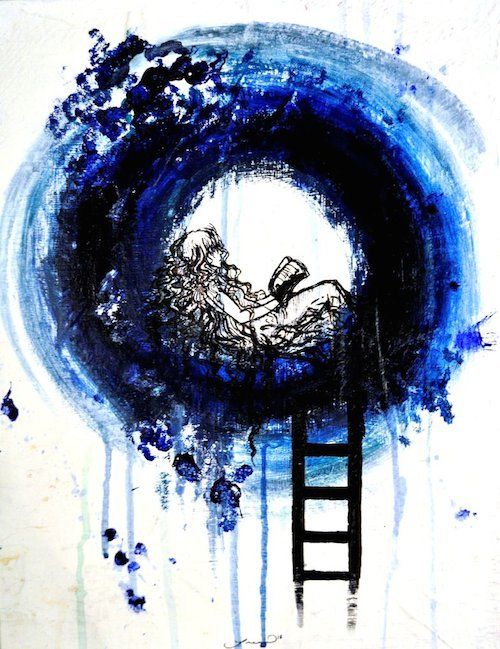Psychological Types of Carl Jung - Extraversion and Introversion
Every person reflects reality in a unique and peculiar way. In different people, consciousness functions differently, but among the many individual differences in human psychology there are also typical features. Some individuals turn their attention to objects and people from the outside environment, others to their own, secluded, inner world. The first prefer the noisy, jolly companies, the various contacts, the communication with new people, and the other peaceful quiet evenings spent at home with a book in hand or relaxing music. These two extremes in character have attracted scientists as early as the 17th century. In their work they refer one extreme to the turning of thoughts into external objects and the other to turning thoughts inwardly into the psyche, the soul, or the spiritual reality. Thus, the concepts of еxtraversion and Introversion arise.To focus the attention of psychologists on this subject largely contributes Jung which reduces the orientations to two types of biological attitudes that underlie his theory of psychological types.

According to Jung, the types of attitude are distinguished by their specific focus on the object or more precisely the libidinal movement. The attitude of the introvert to the object is rejecting, in essence it is always faced with the problem of how the libido can detach itself from the object, as if any attempt of superiority on the part of the object must be continually thwarted. The extra-faith, on the contrary, maintains a definite positive attitude towards the object. It assumes its importance to such an extent that its subjective attitude is permanently oriented and related to the object ... Therefore, extraversion is directed to the interest in the objects in the environment, ie. in an extraversion state one acts, thinks, feels, perceives, experiences with the subject. A person with a similar attitude tends to react immediately and directly to external stimulation. Introversion, respectively, is the withdrawal of interest from the object and its directing to the subject (to the personal conscious experience of the person). In an introverted state, perceptions, thoughts, actions, feelings, experiences are determined by subjective factors. Here, the individual responds with more delayed reactions and acts on the basis of subjective considerations following external stimulation. The contradiction of the types as a universal psychological phenomenon has a biological basis. Typical attitudes are adaptive processes, as an example of which Jung points out the peculiarities of the extraversion that is constantly distributed to the surrounding and Introversion, which constantly seeks to defend itself from external demands. The Introversion of the individual - extraversion is naturally directed outward to the surrounding reality, to the objects, whether they are of a specific or abstract nature and regardless of which channels they have reached. The introverted person is focused on his inner life, his internal reactions, and everything he experiences and happens inside him, that is, one direction is marked by a positive one and the other by a negative attitude towards the object. Both attitudes determine the propensity for a certain reaction to the objects of the external and the inner world, which determines the mode of action, the type of subjective experience and even the way of compensation from the unconscious. In order to clarify the peculiarities and differences of the two individual orientations, it is necessary to differentiate them and consider them separately.

Extraversion
When the orientation towards the objects and the objective facts is so dominant that most important decisions and actions are determined by objective relations, the attitude is extrapolated, and if it is sustainable and lasting it is an extraversion type, when a person lives in accordance with the objective conditions and their demands he is an extravert. In his consciousness, the role of determinative factor plays objective value. His interest and attention follow the objective events, his actions are governed by the influence of people and the things that are related to objective data and limitations. Individuals with predominant extraversion attitude actively interact with the environment. The intensity of their contacts creates the conditions for maximum objectivity. They have a good reproduction function, they deal with precise concepts. They have an emphasized analytic-synthesizing ability, accurately reflect the laws and are able to move their thoughts inductively from the concrete to the common. All of the above-mentioned features represent a perfect adaptation to objective conditions. Morales, who manages the actions of the personality, is in accordance with the requirements of society. If the accepted moral concept changes, then the subjective line that is leading - also without altering the psychological traits of character. Absolute adaptation to objective circumstances should mean ideal adherence, but objective facts can also be abnormal. The normal limit of introscibility is simple adjustment. The extracurriculum seeks to meet objective opportunities by dealing with things that offer future prospects. He tries to do what the environment requires from him and refrains from initiating. On the other hand, the normal development of the extrovert orientation also depends on whether the individual observes his / her subjective needs and needs.
Such an ultimate attitude of consciousness can so much be absorbed in the subject that the subject is totally neglected, and this results in a compensatory attitude of the unconscious, subjective factor. In this aspect, the attitude of unconsciousness, in addition to the conscious attitude of the extraversion type, has a pronounced intracorporal character. It focuses libido on all needs and desires that have been suppressed by the excessively extraversion attitude of consciousness. Clearly objective orientation puts pressure on subjective feelings, intentions and desires. Adaptation and merging with objective reality stop "inadequate" impulses and prevent them from reaching the consciousness. The subjective factor acquires a regressive character, i. the more infantile, archaic and egoistic features of the character have the ultimate extroverts. A characteristic feature of unconscious tendencies is that the more they are deprived of their energy through lack of conscious recognition, the more they acquire a destructive character and consequently their compensatory function disappears. The compensatory attitude of the unconscious finds expression in a particular process of mental equilibrium, because the normal extraversion attitude does not mean that the individual always respects the extra-curricular scheme. It is possible to observe psychological phenomena with intravesical mechanisms in the same person.

Introversion
The simplest definition that can be given to the concept of intra-faith is to direct the interest within yourself. The introversion subject tends not to be interested in the outside world that surrounds it but to find satisfaction in its inner. Intraverted type is governed by subjective factors. It sets the subjective views between perceiving the object and its effect by preventing it from accepting a character corresponding to an objective situation. The decisive determinants that the introversion chooses are subjective. It is guided by factors of perception and knowledge that represent a subjective disposition towards sensory stimuli. When the subject imposes some deviation from the object, the introvert is active, and if he can not revert to it, it is passive.
The differences between the Introversion and the extraversion type in addition to the subjective factor and the organic receptivity also consist in the type and extent of the mental assimilation of the perceived image, the Intravert only trusts the impression that the subject creates in the subject, and the extraversion , respectively, of what the subject creates in the subject. Jung emphasizes that the introverted attitude is governed by a psychological structure determined theoretically by the inheritance. For the subject, it is always a constantly subjective factor. Here Jung refers to the Whole Personality. According to him, a characteristic constant trend for the Intravert is "to mix his Self with the Entire Personality and to raise the Self in rank to a subject of the psychological process, thereby causing" a painful subjectivization of consciousness that greatly distances it from the object. The Individual Individual is part of something universally available in all living beings. A psychological process is embedded in every being, the innate mode of action is called instinct, and Jung suggests that the way in which psychic perception is to be called by the term archetype. It is a symbolic formula that begins to work whenever sensible ideas begin to be lacking, or when those that are present are inapplicable on an internal or external basis. They are usually considered by the individual as being determined by the subject, but their source is in the unconscious structure of the psyche. By the impact of the site, they are simply released. These subjective tendencies and ideas are stronger than the objective impact. They are of higher value and therefore they are placed above all impressions. This is the reason for the Introversion to be incomprehensible how the object can always play a decisive role. It is just as unclear about the extraversion how a subjective point of view can stand higher than the objective situation.
Regarding the attitude of the unconscious, introversion also develops a relationship of compensation, but in the form of unconscious reinforcement under the influence of the object. By nature, the introvert-oriented individual is a subjective being. In each situation or behavior, he distinguishes two sides: one is the influence of the world on him, the demands of others, and the other reality is broken through the prism of his own eyes. However, this does not mean that the introvert lives in a world of its own. For him, reality is the source of significant subjective experiences. He can not adapt to the unknown because it does not fit into the picture of the tranquil setting in his life. To avoid tension, he prefers to close himself.
Very nice post about one big hero of my youth and later in university.
When I was studying psychology Carl Jung showed me my main way of thinking and acting, but the most extraordinary thing was that he opened my eyes to understand that I could learn to identify, relate, and understand better the other people around me.
I learned a lot about how my experience and the other person experience and interfere in a positive way in the resulting interexperience
I'm extroverted with a passion for variety, new adventures, and actions and work in cooperative groups, a sensitive that like to create a good communicational environment with a delicate appreciation of others' feelings, and I'm an intuitive explaining in my insatiable search for new situations, experiences, challenges and curiosity.
And Jung gave me a lot and continues to do it. I am most concerned with his psychology. Thank you for the comment.
By the way is your avatar inspired from this great band:
Carl Jung is one of the authors, that every time I read the same books I always find out new revelations.
Congratulations for being the first person to identify my avatar.:)
I don't know many people that knows The Residents, the best , oldest and most unknown bands in the world.
I've seen it two times live and my passion for them has gone up to the sky including Renaldo & the Loaf.
I've around 400 albums of the Residents in my collection. hehe
New bands are coming that are doing the same kind of sound like Shitty Bedford, Randy Rose (vocalist of residents solo), Locust Fellow & Friends, Ostrich Von Nipple, Bretts Milk, Dead Man's Underwear, Nolan Cook
And for me Carl Jung is of these authors that I really love like he is my closest friend.
Wow, 400 albums... I have listened only around 100, starting from "Demons Dance alone" period :) I would love to go to their concert but if they come again in Europe.
Thanks for the bands recommendation, my favorite band influenced from The Residents is The Primus-
what most strikes me the attention of this theory is that precisely an extrovert depending on the situation can become introverted and vice versa
Yes the human nature is really variable
A great publication .. very nutritious. Congratulations.
thank u
The psychological info you blog @godflesh is truly educational and informative. Shalom man
You are welcome :)
https://steemit.com/@a-0-0
You got a 9.32% upvote from @postpromoter courtesy of @godflesh!
Want to promote your posts too? Check out the Steem Bot Tracker website for more info. If you would like to support the development of @postpromoter and the bot tracker please vote for @yabapmatt for witness!
thanks
To listen to the audio version of this article click on the play image.

Brought to you by @tts. If you find it useful please consider upvote this reply.
cool :)